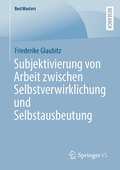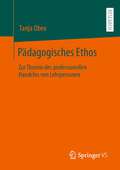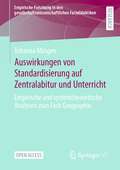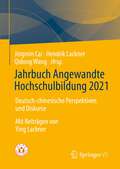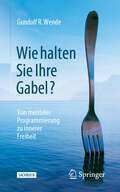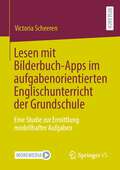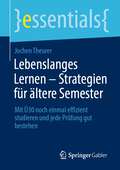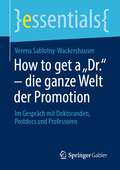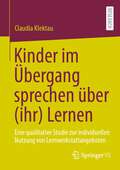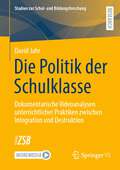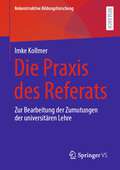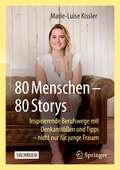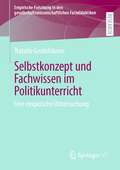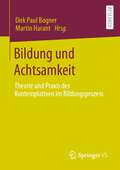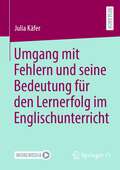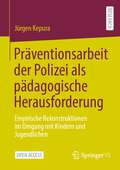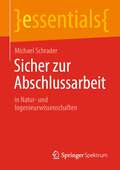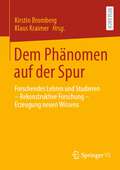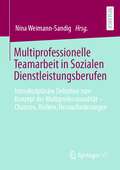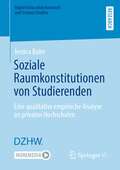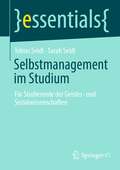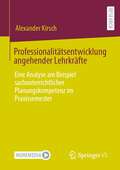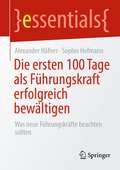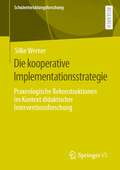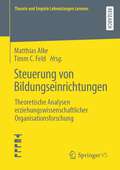- Table View
- List View
Subjektivierung von Arbeit zwischen Selbstverwirklichung und Selbstausbeutung (BestMasters)
by Friederike GlaubitzDieses Buch gibt Einblicke in die historische Entwicklung des Wandels von Arbeitskraft aus Sicht der arbeits- und industriesoziologischen Forschung und beleuchtet dabei die Gründe für die spätmodernen Anforderungen an und Einforderungen von Lohnarbeitenden. Aufgrund von Strukturwandel und einem Paradigmenwechsel in der Arbeitsorganisation ab den 1970 / 80er Jahren erfordert die postmoderne Lohnarbeit von den Arbeitssubjekten verstärkt das Einbringen von subjektiven Potenzialen. Dabei sind z. B. Selbststrukturierung, -kontrolle und -ökonomisierung, aber auch eine unternehmerische Denkweise und motiviertes Arbeitshandeln gefragt, um die Tätigkeiten der heutigen Zeit ausführen zu können. Ab dem gleichen Zeitpunkt werden auf Beschäftigtenseite Ansprüche laut, die ebenfalls auf die Einbringung subjektiver Potenziale in die Lohnarbeit abzielen: Selbstentfaltung und -verwirklichung, die Vereinbarkeit von Arbeit und Privatleben sowie das ‚qualitativ gute Leben‘ werden gefordert. Beide Tendenzen werden arbeitswissenschaftlich als ‚doppelte Subjektivierung‘ zusammengefasst und in der vorliegenden Arbeit im Detail betrachtet sowie Chancen und Risiken dieser Entwicklung erörtert.
Pädagogisches Ethos: Zur Theorie des professionellen Handelns von Lehrpersonen
by Tanja ObexDie Dissertation beschäftigt sich aus professionstheoretischer Perspektive mit dem Phänomen des pädagogischen Ethos von Lehrer*innen. Sie will eine Antwort auf folgende Frage geben: Wie kann Ethos als Element pädagogischer Professionalität von Lehrer*innen konzipiert werden, und welche Elemente enthält eine solche Theorie des pädagogischen Ethos? Ausgangspunkt ist erstens die Feststellung, dass Ethos zwar als zentrales Element pädagogisch professionellen Handelns gilt, eine systematische Integration in Modelle professionellen Handels aber bislang nicht vorliegt. Zweitens wird die Kritik an einer strukturtheoretischen Professionstheorie geteilt, die durch die Hervorhebung von Widersprüchen und Antinomien im Handeln von Lehrpersonen den Beruf als einen unmöglichen rahmen. Die These lautet, dass sich mit einem Konzept von Ethos als Praxis ein pädagogischer Umgang mit strukturellen Antinomien beschreiben lässt, ohne den Anspruch auf Professionalität aufgeben zu müssen. Ausgehend von Hans Joas‘ Theorie des kreativen Handelns wird pädagogisches Ethos als spezifische Form experimentellen Handelns mit den Dimensionen Kontingenz, Ethik und Macht konzipiert. Ethos antwortet auf Handlungshemmungen, die durch pädagogische Antinomien ausgelöst werden. Mittels Analysen von videografiertem Unterrichtsmaterial lassen sich die Aspekte Relationalität und Körperlichkeit als Denkvoraussetzungen einer Theorie des pädagogischen Ethos rekonstruieren. Pädagogisches Ethos hat die Qualität eines experimentellen Handelns, weil ‚unmögliche‘ Entscheidungen getroffen werden, die einer Rationalität eigener Art folgen: einer Rationalität, die in dem – unausgesprochenen – Versprechen gegenüber sich selbst gründet, eine ‚Sache‘ gut zu machen.
Auswirkungen von Standardisierung auf Zentralabitur und Unterricht: Empirische und systemtheoretische Analysen zum Fach Geographie (Empirische Forschung in den gesellschaftswissenschaftlichen Fachdidaktiken)
by Johanna MäsgenIn diesem Open-Access-Buch werden mithilfe der forschungsleitenden Frage: „Wie ist Geographieunterricht angesichts des Zentralabiturs möglich?“ die Auswirkungen der Einrichtung beziehungsweise funktionalen Umdeutung des Zentralabiturs in den Bundesländern untersucht und systemtheoretisch interpretiert. In einer quantitativen Studie wird gezeigt, dass die Standardisierungsbemühungen der Bildungspolitik durch die Umsetzung in der Schulorganisation zu standardisierten Zentralabiturprüfungsaufgaben auf der Ebene der Bundesländer führen. In einer qualitativen Interviewstudie werden die Möglichkeiten von Geographielehrer_innen nachvollzogen, angesichts des Zentralabiturs zu handeln. Die Ergebnisse beleuchten das Zusammenspiel von Zentralabitur, Unterricht und unterrichtlichen Klausuren und die Rolle von Akteur_innen. Die individuellen Handlungsphänomene divergieren, dennoch können Typen identifiziert werden, die sich hinsichtlich der Intensität und der Frequenz der schulischen Gestaltung unterscheiden. Die systemtheoretische Interpretation der empirischen Ergebnisse kommt zu dem Ergebnis, dass der Unterricht – und damit das Erziehungssystem als Ganzes – durch Selbst- und Fremdbeschränkung sowie durch Konkurrenz von Vermittlung/Aneignung und Selektion gefährdet ist.
Jahrbuch Angewandte Hochschulbildung 2021: Deutsch-chinesische Perspektiven und Diskurse
by Ying LacknerDas Buch fasst hochaktuelle Forschungsbeiträge zur Fachhochschulforschung zusammen, die im Kontext der Kooperation und des Austausches zwischen Deutschland und China stehen. Als dialogisch angelegte Plattform entwickelt dieses Jahrbuch die Fachhochschulforschung weiter und schafft eine erste konzeptuelle und publikatorische Rahmung für die weitere Selbstreflexion und Identitätsbildung des Konzepts "angewandte Wissenschaften".
Wie halten Sie Ihre Gabel?: Von mentaler Programmierung zu innerer Freiheit
by Gundolf R. WendeWer mentale Programmierungen erkennt und bei sich ändert, wird innerlich souverän und kann frei und selbst bestimmt gestalten. In der Regel ist uns nicht bewusst, dass sich bereits in frühester Kindheit und Jugend die Art und Weise unseres Denkens und Handelns manifestiert. Daran ändert sich meist während unseres ganzen Lebens recht wenig. Doch was, wenn Wirtschaft, Gesellschaft und Arbeitswelt sich jetzt so schnell und radikal wandeln wie nie zuvor – während wir unbewusst bei alten Programmierungen bleiben? Wir werden innerlich unsicher, agieren zaghaft und unsouverän. Es mangelt uns an mentaler Flexibilität und psychologischer Sicherheit, um den Wandel zu gestalten. Wir sind häufig im Widerstand und klammern uns an Hergebrachtes, ohne wirklich zu begreifen, warum. Wir verstehen die Programme dahinter nicht.Das Buch richtet sich an ein breites Publikum. Es spricht all diejenigen an, die das Gefühl haben, „festzustecken“ und die freier und selbst bestimmter leben möchten. Leistungsorientierte Menschen in verantwortungsvollen Positionen in Wirtschaft, Politik, Wissenschaft, Kultur etc., suchen in einer brüchigen, nicht-linearen Welt einen inneren Anker, um mutig und inspiriert Neues gestalten zu können.
Lesen mit Bilderbuch-Apps im aufgabenorientierten Englischunterricht der Grundschule: Eine Studie zur Ermittlung modellhafter Aufgaben
by Victoria ScheerenIm Einklang mit aktuellen wissenschaftlichen Ergebnissen belegt diese qualitative Studie, dass Englischlernende der Grundschule im Bereich der Lesekompetenz bislang unterschätzt werden. Verortet in einem freiwilligen Nachmittagsprogramm für Englischlernende geht die vorliegende Aktionsforschung dazu folgenden Fragen empirisch auf den Grund: Was fällt Lernenden beim eigenständigen Lesen von Bilderbuch-Apps schwer und welche Unterstützungsangebote helfen ihnen? Welche Merkmale weisen Aufgaben auf, die ausgewählte Multiliteracies anbahnen und App-spezifische Schwierigkeiten reduzieren? Grundlage bilden drei Datensätze, welche mit der Dokumentarischen Methode ausgewertet werden.
Lebenslanges Lernen – Strategien für ältere Semester: Mit Ü30 noch einmal effizient studieren und jede Prüfung gut bestehen (essentials)
by Jochen TheurerLebenslanges Lernen wird immer wichtiger. Doch mit über 30 Jahren nochmal zurück an die Uni? In diesem essential zeigt Jochen Theurer am eigenen Beispiel, wie man im fortgeschrittenen Lebensalter auch mit familiären und beruflichen Bindungen erfolgreich und gelassen ein zweites Mal studiert. Denn dafür ist es nie zu spät. Und mit Ü30 verfügen Sie über Ressourcen, von denen mancher frischgebackene Abiturient nur träumen kann.
How to get a „Dr.“ – die ganze Welt der Promotion: Im Gespräch mit Doktoranden, Postdocs und Professoren (essentials)
by Verena Sablotny-Wackershauseressentials liefern aktuelles Wissen in konzentrierter Form. Die Essenz dessen, worauf es als „State-of-the-Art“ in der gegenwärtigen Fachdiskussion oder in der Praxis ankommt. essentials informieren schnell, unkompliziert und verständlichals Einführung in ein aktuelles Thema aus Ihrem Fachgebietals Einstieg in ein für Sie noch unbekanntes Themenfeldals Einblick, um zum Thema mitreden zu könnenDie Bücher in elektronischer und gedruckter Form bringen das Expertenwissen von Springer-Fachautoren kompakt zur Darstellung. Sie sind besonders für die Nutzung als eBook auf Tablet-PCs, eBook-Readern und Smartphones geeignet. essentials: Wissensbausteine aus den Wirtschafts-, Sozial- und Geisteswissenschaften, aus Technik und Naturwissenschaften sowie aus Medizin, Psychologie und Gesundheitsberufen. Von renommierten Autoren aller Springer-Verlagsmarken.
Kinder im Übergang sprechen über (ihr) Lernen: Eine qualitative Studie zur individuellen Nutzung von Lernwerkstattangeboten
by Claudia KlektauWie sprechen Kinder, die kurz vor der Einschulung stehen, über ihr Lernen im Kindergarten, insbesondere in der Lernwerkstatt? Und welche Vorstellungen haben sie vom Lernen in der Schule? Diese Fragen stehen im Zentrum der vorliegenden Studie. Über detaillierte fallspezifische Rekonstruktionen wird expliziert, wie unterschiedlich Kinder das räumlich-materielle Arrangement einer Lernwerkstatt im Kindergarten für eigene individuelle Lernpraktiken nutzen und welche Orientierungen dabei für sie handlungsleitend sind. Anhand der von der Autorin analysierten Interviews mit Kindergartenkindern wird zudem gezeigt, welche Vorstellungen und Bilder diese von Schule respektive schulischem Lernen aufrufen und welche Entwicklungsaufgaben, die sich den Kindern im Übergang zur Grundschule stellen, sichtbar werden. Die Ergebnisse der Studie weisen auf die Bedeutung der professionellen Begleitung des Übergangs vom Kindergarten in die Grundschule hin und sind so auch für Pädagog*innen beider Institutionen von Interesse.
Die Politik der Schulklasse: Dokumentarische Videoanalysen unterrichtlicher Praktiken zwischen Integration und Destruktion (Studien zur Schul- und Bildungsforschung #92)
by David JahrDavid Jahr untersucht in dieser Studie die Schulklasse als Kollektiv. Auf Basis von Unterrichtsvideografien rekonstruiert der Autor die Prozessstrukturen von vier Klassen, die gemeinsam eine politische Unterrichtsmethode (Dorfgründungssimulation) durchführen und dabei eine politische Struktur hervorbringen. Im Kern schließen die Schulklassen hierfür an ihre bisher konstituierte informelle Hierarchie an. Der zentrale Befund, dass sich die Politik der Schulklasse typisiert als Integration, Distinktion oder Destruktion differenzieren lässt, wird abschließend vor dem Hintergrund politikdidaktischer Wissensbestände eingeordnet.
Die Praxis des Referats: Zur Bearbeitung der Zumutungen der universitären Lehre (Rekonstruktive Bildungsforschung #39)
by Imke KollmerDie Arbeit widmet sich dem studentischen Referat in Universitätsseminaren. Diese in den geistes- und sozialwissenschaftlichen Disziplinen etablierte Form studentischer Beteiligung wird in Bezug auf ihre interaktionslogische Funktion und Bedeutung untersucht. Erkenntnisleitend ist hierbei die These, dass Referate eine für Dozierende spezifische Form der Bearbeitung der Zumutungen der universitären Lehre darstellen. Das Referat wird von aller Inanspruchnahme einer gelingenden Lehrpraxis gelöst und theoretisch wie empirisch als Ausdrucksgestalt der deutschen Universität rekonstruiert. Anhand des Fokus auf die kommunikative Orientierung seminaristischer Praxis mit und ohne Referate lassen sich überdies zentrale Elemente einer Theorie der universitären Lehre skizzieren.
80 Menschen – 80 Storys: Inspirierende Berufswege mit Denkanstößen und Tipps – nicht nur für junge Frauen
by Marie-Luise KisslerOb Bundestagsabgeordnete, Tattoo-Künstlerin, Chocolatier oder Schornsteinfegerin – das Leben ist ein Kaleidoskop von Möglichkeiten. Dieses Buch zeigt 80 Persönlichkeiten und inspiriert junge Menschen ihren eigenen, einzigartigen Berufsweg zu verwirklichen.Die Interviews enthalten exklusive Ratschläge von 80 erfolgreichen Role Models - sie erzählen aus ihrem Leben, nennen berufliche Erfolge und Fehler beim Namen und verraten persönliche Tipps und Tricks, wie junge Frauen zwischen Selbst- und Fremdanspruch ihre eigene Berufung finden. Die 80 Interviewpartnerinnen sind: Trixie Bannert – Claudia Bechstein – Sandra Berndt – Marco Boos – Sylvia Borcherding – Katja Borghaus – Julia Börs – Julia Bösch – Andrea Bruckner – Ilka Brühl – Linda Burchhardt – Frank Buschmann – Valentina Daiber – Angela De Giacomo - Vanessa Didam – Sabine U. Dietrich – Özlem Doger-Herter – Anja Dorny – Julia Dorny – Katharina Fankidejski – Emilia Fehse – Bettina Fetzer – Nicolette Fountaris – Marie-Christin Ghanbari – Kirsten Heike Giering – Saskia Stella Gleitsmann – Laura Große – Laura Halfas – Ilka Hartmann – Caitlin Hennen – Josephine Henning – Verena Herb – Ulrike Hiller – Nicole Hölscher – Elke Holst – Bettina Hueske – Petra Justenhoven – Lise-Christine Kobla Mendama – Hatice Koca – Carmen Köhler – Anne Kozlowski – Dirk Kreuter – Toma Kubiliute – Kevin Kugel – Ricarda Lang – Meriem Lebdiri – Monika Maria Lehmann – Elisabeth Lepique – Susanne Liebermann – Chenchao Liu – Dubravka Maljevic – Thomas Mickeleit – Lan Anh Nguyen – Martina Niemann – Laura Nolte – Bettina Pauck – Susanne Pfab – Astrid Quentell – Angelique Renkhoff-Mücke – Johanna Röh – Colette Rückert-Hennen – Nicole Schilling – Sabine Schmittroth – Laura Schönberger – Gabriele Sons – Britta Steffen – Julian F. M. Stoeckel – Sarah Süß – Martyna Trajdos – Marie-Christine Trappen – Anastasia Umrik – Lisa Unruh – Katja von Doren – Linda van Rennings – Christina Virzí – Marion A. Weissenberger-Eibl – Hiltrud Dorothea Werner – Alina Wichmann – Nicola Winter – Laura Zieger.
Selbstkonzept und Fachwissen im Politikunterricht: Eine empirische Untersuchung (Empirische Forschung in den gesellschaftswissenschaftlichen Fachdidaktiken)
by Natalie GrobshäuserDieses Buch leistet einen empirischen Beitrag zur Aufklärung der Bedeutung von Motivation im Politikunterricht und fokussiert auf das Selbstkonzept als motivationale Voraussetzung für politisches Lernen. An einer Stichprobe über 1324 Realschüler*innen der neunten Jahrgangsstufe untersucht Natalie Grobshäuser den Zusammenhang zwischen dem Selbstkonzept und dem Fachwissen im Politikunterricht. Dabei wird das Selbstkonzept als mehrdimensionales Konstrukt in vier Facetten aufgefächert und als Einflussfaktor auf das politische Fachwissen modelliert. Zur Messung des Fachwissens wird ein Kompetenztest eingesetzt und durch Raschskalierung ausgewertet. Die Ergebnisse zeigen bedeutsame Effekte der Selbstkonzept-Facetten: sowohl außerschulische als auch fachspezifische Einschätzungen der Schüler*innen über ihre Fähigkeiten in der Begegnung mit dem Politischen bedeuten ein Mehr an politischem Fachwissen.
Bildung und Achtsamkeit: Theorie und Praxis des Kontemplativen im Bildungsprozess
by Dirk Paul Bogner Martin HarantIn diesem Herausgeberband wird die Diskussion um die Bedeutung der Wiederentdeckung der ästhetischen und kontemplativen Dimension von Bildung, die im angelsächsischen Raum bereits seit einiger Zeit theorie- und forschungsbasiert geführt wird, für die pädagogische Diskussion im deutschsprachigen Raum aufgegriffen und fruchtbar gemacht. Während im deutschsprachigen Raum vermehrt Publikationen zu Schule und Achtsamkeit erscheinen, stellt die bildungstheoretische und forschungsbasierte Auseinandersetzung mit Bildung und Mindfulness derzeit noch ein Desiderat dar, wenngleich sich erziehungswissenschaftliche Stimmen mehren, der Idee der kontemplativen Wende in der Bildung auch im deutschsprachigen Diskurs mehr Beachtung zu schenken. Über dieses Desiderat hinaus macht sich die Publikation zur Aufgabe, die Diskussion zu Bildung und Mindfulness aus einem dezidiert bildungstheoretischen Fokus heraus zu schärfen, was derzeit auch im angelsächsischen Raum noch kaum Beachtung erfährt.
Umgang mit Fehlern und seine Bedeutung für den Lernerfolg im Englischunterricht
by Julia KäferDie Arbeit widmet sich dem Umgang mit Fehlern im Unterricht und untersucht empirisch seine Bedeutung für den Lernerfolg von Schülerinnen und Schülern im Fach Englisch der Sekundarstufe I. Hierzu wird ein multiperspektivischer Untersuchungsansatz verfolgt: Neben der Perspektive der Schülerinnen und Schüler werden auch Einschätzungen externer Beobachterinnen und Beobachter zum Umgang mit Fehlern im Unterricht herangezogen. Unter Berücksichtigung des aktuellen theoretischen und methodischen Forschungsstandes wird damit einerseits der Zusammenhang zwischen der Wahrnehmung von Schülerinnen und Schülern zum Umgang mit Fehlern im Unterricht und ihrer Leistung wie auch ihrer Lernmotivation untersucht und gleichzeitig geprüft, inwieweit die Schülerwahrnehmung durch individuelle Schülermerkmale sowie durch Merkmale des Lernkontexts beeinflusst wird. Andererseits wird in dieser Arbeit das Potenzial der in der empirischen Unterrichtsforschung bislang wenig eingesetzten Thin-Slices-Methode exploriert und geprüft, inwieweit heuristische Urteile externer Beobachterinnen und Beobachter geeignet sind, um ein so spezifisches und komplexes Unterrichtsmerkmal wie den Umgang mit Fehlern zuverlässig zu erfassen.
Präventionsarbeit der Polizei als pädagogische Herausforderung: Empirische Rekonstruktionen im Umgang mit Kindern und Jugendlichen
by Jürgen KepuraMit diesem Open-Access-Buch wird ein Beitrag zur Professionalisierung der Präventionsarbeit der Polizei geleistet. Polizeibeamtinnen und Polizeibeamten müssen in der täglichen Präventionspraxis unterschiedlichsten Erwartungen gleichzeitig gerecht werden. Die Akteurinnen und Akteure bewegen sich in einem Spannungsfeld, das sich zwischen einer instruierenden Normverdeutlichung und einer entwicklungsorientierten Normvermittlung entfaltet. Der Autor arbeitet den pädagogischen Charakter und die hybriden Anforderungen des Handelns heraus. In der Präventionsarbeit müssen gleichzeitig wirkmächtige polizeiliche und pädagogische Perspektiven balanciert werden. Grundlage für diese Erkenntnisse sind Gruppendiskussionen, die mit Polizistinnen und Polizisten geführt und mit der Dokumentarischen Methode ausgewertet wurden. Das empirische Ergebnis mündet in Konturen einer Professionalitätstheorie für die polizeiliche Präventionsarbeit mit Kindern und Jugendlichen. Die Studie gibt Impulse für die erziehungswissenschaftliche Professionalitätsforschung und die Entwicklung einer aufgabenspezifischen polizeilichen Handlungstheorie.
Sicher zur Abschlussarbeit: in Natur- und Ingenieurwissenschaften (essentials)
by Michael SchraderDiese Anleitung wird Sie mit vielen Tipps bei der Planung Ihrer Abschlussarbeit unterstützen. Dazu werden Vorgaben zur Strukturierung Ihrer Arbeit sowie die Bausteine naturwissenschaftlicher Publikationen vorgestellt. Mittels umfangreicher tabellarischen Checklisten können Sie dann selbst Ihre Arbeit optimieren. Es folgen Hinweise zur Abgabe und zu Aktivitäten danach. Dabei bleibt dieser Text so kompakt, dass Sie ihn parallel zur Erstellung Ihrer Arbeit erarbeiten können.
Dem Phänomen auf der Spur: Forschendes Lehren und Studieren – Rekonstruktive Forschung – Erzeugung neuen Wissens
by Kirstin Bromberg Klaus KraimerDas Buch zeigt auf, wie wissenschafts- und forschungsorientierte Partizipation, Qualifizierung und Weiterbildung realisiert werden kann. Es vermittelt, wie Verstehen methodisch angeleitet werden muss, wenn nicht schematisch zugeordnet und gehandelt, sondern professionell agiert werden soll. Der Band vereint daher Beiträge, die Phänomenen auf der Spur sind, die erhellende, verblüffende oder ernüchternde Schlüsse ziehen und die auf vergessene sowie neue Zusammenhänge hinweisen. Hierüber wecken die Beiträge Interesse an der Entdeckung des Neuen, an Spurensuche, an Phänomenen des Biografischen, des Sozialen und des Pädagogischen.
Multiprofessionelle Teamarbeit in Sozialen Dienstleistungsberufen: Interdisziplinäre Debatten zum Konzept der Multiprofessionalität – Chancen, Risiken, Herausforderungen
by Nina Weimann-SandigDas Handbuch beleuchtet das Feld der Sozialen Dienstleistungen aus interdisziplinärer Perspektive und geht dabei folgenden Fragen nach: Welche Möglichkeiten und Strategien gibt es in multi-professionellen Teams, um Machtungleichgewichte und Kompetenzstreitigkeiten zu beseitigen? Welche neuen Kommunikations- und Organisations-, Supervisions- oder Beratungskonzepte braucht es, um die Zusammenarbeit multi-professioneller Teams zu ermöglichen? Ebenso: welche Fallstricke und Herausforderungen gilt es zu meistern? Weiterhin widmet sich das Buch der Frage, welche innovativen Methoden und Instrumente der Personalentwicklung geeignet sind, um multi-professionelle Teams fest in den Einrichtungen zu etablieren oder auch zum Abbau von Geschlechterstereotypen und Genderlabeling beizutragen. Nicht zuletzt versteht sich das Handbuch als Beitrag zur Reflektion der Professionalisierungsdebatten im Feld der Sozialen Dienstleistungsberufe.
Soziale Raumkonstitutionen von Studierenden: Eine qualitative empirische Analyse an privaten Hochschulen (Higher Education Research and Science Studies)
by Jessica BaierDie empirische Arbeit widmet sich Hochschulen in privater Trägerschaft aus Sicht ihrer Studierenden. Aufgrund spezifischer Standortlogiken können private Hochschulen in ihren dualen, berufsbegleitenden oder -integrierten Studienformaten lokale bzw. regionale Arbeitsmarkt- und Wirtschaftsstrukturen berücksichtigen oder eine Orientierung an der vorhandenen Fachkräftenachfrage vornehmen. Im Forschungsprozess kommen aus diesem Grund raumsoziologische Zugänge von Martina Löw und Georg Simmel zur Anwendung. Mit diesen werden studentische Nutzungen, Aneignungen und Wahrnehmungen als sozial erzeugte (Hochschul-)Räume untersucht, in die die private Hochschule auf unterschiedliche Weise als räumlicher Bezugspunkt einfließt. Ergebnis der empirischen Analyse in Orientierung an der Vorgehensweise der Grounded-Theory-Methodologie bilden empirische und Idealtypen, die Einblicke in Studierendensichten auf die private Hochschule, das Hochschulstudium und den Hochschulstandort geben. Für die Hochschulforschung werden Erkenntnisse darüber beigesteuert, in welcher Hinsicht private Hochschulen und ihre Standorte für Studierende interessant sind. Für das Hochschulmanagement kann abgeleitet werden, inwiefern Angebote der Hochschule und des Standortes durch Studierende aufgegriffen werden, um diese künftig adäquat zu adressieren und ggf. besser örtlich binden zu können.
Selbstmanagement im Studium: Für Studierende der Geistes- und Sozialwissenschaften (essentials)
by Tobias Seidl Sarah SeidlDurch den essentials-Band werden Sie in der Weiterentwicklung Ihrer Selbstmanagementkompetenzen unterstützt. Durch das Einüben vielfach bewehrter und einfach umsetzbarer Methoden sowie das Reflektieren des eigenen Denkens und Handelns lernen Sie wichtige Strategien für die Bewältigung der Herausforderungen des Studiums kennen und einzusetzen. Die dabei entwickelten Kompetenzen unterstützen Sie nicht nur in Ihrem Studienalltag, sondern sind auch von großer Bedeutung für den erfolgreichen Start in das Berufsleben.
Professionalitätsentwicklung angehender Lehrkräfte: Eine Analyse am Beispiel sachunterrichtlicher Planungskompetenz im Praxissemester
by Alexander KirschFachbezogene Planungskompetenzen bilden einen wesentlichen Bestandteil der Professionalität von Lehrkräften und sind im Rahmen institutionalisierter Lerngelegenheiten der Lehrerbildung wie dem seit 2015 in Nordrhein-Westfalen durchgeführten Praxissemester auszubilden. Die tatsächliche Wirksamkeit derartiger Langzeitpraktika ist professionstheoretisch jedoch umstritten. Die Arbeit untersucht die spezifische Wirkung des Praxissemesters auf die Entwicklung von Planungskompetenzen bei angehenden Lehrkräften im Fach Sachunterricht. Zu diesem Zweck werden die Entwicklungen eines Kompetenzstrukturmodells als Referenzrahmen für Wirksamkeitsaussagen sowie eines Rasch-skalierten Messinstrumentes zur standardisierten und validen Erfassung der interessierenden Kompetenz beschrieben. Die dargestellten Ergebnisse einer umfassenden Pilotierungsstudie belegen die generelle Eignung des entwickelten Instrumentes, das im Rahmen eines quasi-experimentellen Forschungsdesigns anschließend für eine Prä-Post-Untersuchung bei Studierenden an der Universität Paderborn eingesetzt wurde. Die berichteten Ergebnisse dieser Studie deuten darauf hin, dass das Praxissemester entgegen der damit verbundenen Intention keine signifikant positiven Effekte auf die Entwicklung der interessierenden Kompetenz hat.
Die ersten 100 Tage als Führungskraft erfolgreich bewältigen: Was neue Führungskräfte beachten sollten (essentials)
by Alexander Häfner Sophie HofmannWie kann ich als neue Führungskraft erfolgreich starten? Wie bekomme ich die Unterstützung meines Teams? Das Buch gibt Tipps für einen gelingenden Start in die erste Führungsfunktion. Impulsfragen und Fallbeispiele aus der Praxis laden zur Reflexion des persönlichen Führungshandelns ein. Die vorgestellten Führungsansätze und Praxistools können auch für erfahrene Führungskräfte gewinnbringend sein.
Die kooperative Implementationsstrategie: Praxeologische Rekonstruktionen im Kontext didaktischer Interventionsforschung (Schulentwicklungsforschung #3)
by Silke WernerDidaktische Interventionsstudien bilden eine zentrale Quelle, um wissenschaftliches Wissen über die Effektivität neuer Lehr- und Lernformen im Unterricht zu generieren. Eine Herausforderung bei dieser Form der Forschung ist: die Interventionen müssen zunächst implementiert werden, ehe eine statistische Analyse ihrer Wirksamkeit erfolgen kann. Kooperativen Implementationsstrategien (bzw. symbiotischen Implementationsstrategien) wird dahingehend ein hohes Potential zugerechnet. Im Rahmen einer dokumentarischen Evaluationsstudie geht Silke Werner in diesem Band nun der Frage nach, welchen ‚Nutzen‘ kooperative Implementationsstrategien im Kontext didaktischer Interventionsstudien haben (können). Es wird theoretisch und empirisch gezeigt, dass widersprüchliche Intentionen der beteiligten Akteur*innen (Bildungspolitik, Forschung, Schulpraxis) zusammenwirken und diese nicht per se über eine kooperative Implementation auflösbar sind. Die rekonstruierten Typen kooperativer Rekontextualisierungspraxen lassen sich – am Beispiel der didaktischen Intervention „Serelisk“ – auf Merkmale der Zusammensetzung der Kooperationsgruppen zurückführen. Die vorliegende Studie ist zugleich eine dokumentarische Meta-Evaluation und trägt zur Methodendiskussion in der didaktischen Interventionsforschung bei.
Steuerung von Bildungseinrichtungen: Theoretische Analysen erziehungswissenschaftlicher Organisationsforschung (Theorie und Empirie Lebenslangen Lernens)
by Timm C. Feld Matthias AlkeEine Voraussetzung für die erfolgreiche Realisierung lebenslangen Lernens liegt in Bildungseinrichtungen, die den Rahmen für die professionelle Begleitung und Unterstützung individueller Lern- und Bildungsprozesse schaffen. Mit Blick auf die organisationale Ebene rücken dann Steuerungsfragen in den Fokus, die auch auf eine Erneuerung oder Verbesserung der strategischen, strukturellen, kulturellen sowie angebotsbezogenen Merkmale und Prozesse der Bildungseinrichtungen zielen. Der Sammelband zielt darauf ab, Potentiale als auch Grenzen unterschiedlicher grundlagentheoretischer Zugänge (Systemtheorie, Neo-Institutionalismus, Soziologie der Konventionen) aufzuzeigen, um steuerungsbezogene Fragen von Bildungseinrichtungen zu analysieren und empirisch zu untersuchen.
